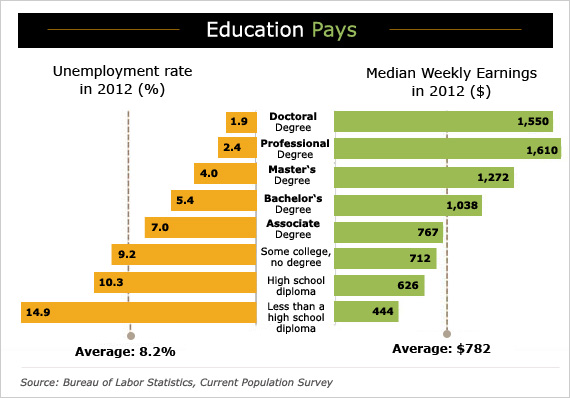Once, white Americans across all classes shared a common culture when it came to “the basics”– marriage, work, religion and law-abidingness, argues political scientist Charles Murray in his new book, Coming Apart: The State of White America, 1960-2010. That’s all changed in the past five decades. “The white working class has deteriorated substantially on those four dimensions. It’s fallen away from some central cultural institutions that have been crucial to what used to be called the American way of life,” he told The Fiscal Times this week. “Meanwhile, a new upper class has developed a distinctive culture in their delayed marriage and childbearing; in their child-rearing practices; in their work environments; in their comparatively sparse exposure to mainstream film and television products; and in their increasing geographic isolation. They’re increasingly ignorant about how the rest of America lives.”
RELATED: The ‘One Percent Workforce’ Threatens U.S. Growth
With those at the top and bottom barely interacting, Murray argues that American culture is not just coming apart at the seams – it’s already there. And dangerously so. “It’s a bad thing for people who have a great deal of influence not to know what kind of country they’re governing,” he says. The solution? “America’s new upper class must once again fall in love with what makes America different.”
To avoid the controversy about race and IQ that surrounded his earlier and probably best-known book, The Bell Curve, Murray focused solely on white America this time around. He wanted “to get rid of distractions,” he says. “If I’d included everybody, readers could reasonably wonder much of the problems are grounded in America’s racial and ethnic history. [This way], those explanations are out the window.”
Murray is the W. H. Brady Scholar at the American Enterprise Institute and the author of other books that include Losing Ground and What It Means to Be a Libertarian. Edited excerpts from our interview:
The Fiscal Times (TFT): American social and economic mobility is not dead, you say. How so, given your thesis?
Charles Murray (CM): If you’re a talented youth, especially academically, with good grades and good test scores, it doesn’t make any difference where you’re from or what your background is. And if you’re really academically talented, the elite colleges have gotten very good at identifying you and paying you to be there. So the way up has never been more open for the talented.
They [the white upper class] are passing down to their children not just money, but talent. After awhile, you get more of a layer cake kind of society, instead of how it was in the early days, when talent was located throughout society.
TFT: How about mobility for others?
CM: The ways in which it’s not as good are a consequence of what happens in a meritocracy over generations. It used to be shirtsleeves to shirtsleeves in three generations: One man makes the money; his children spend some of it but not all of it; then the third generation spends all of it and has to go back to work again. But that was when the guy making the money was marrying the girl next door, or marrying the girl he meets at the country club. So probably they’re pretty average in ability. These days, among the really successful, the male lawyer from Harvard Law School who’s a partner in a big New York law firm tends to marry the woman he’s met during litigation who’s from Yale Law School and is also really smart. They’re passing down to their children not just money, but talent. After awhile, you tend to get more of a layer cake kind of society, than in the early days – when huge amounts of talent were located throughout society, without regard to socioeconomic status.
TFT: You don’t discuss the causes of this. Why not?
CM: There’s a reason for that. The causes are very contentious. I’m on record in Losing Ground as saying that the reforms of the 1960s were a major contributing factor to problems with out-of-wedlock births, to problems with men dropping out of the labor market, with crime and so forth – and I continue to believe that. Now, there are people who, if I tried to make that case in this book, would throw the book against the wall and not read it. I really think these problems transcend political ideology. We need to have people on both the left and the right talking about the nature of the problem. So I didn’t talk about causes. Until there’s a serious appreciation of the nature of that problem – it’s way too premature to talk about solutions.
American community has been very vital. It’s been the exceptional characteristic of our country, much more so than in other parts of the world… And the people available for that kind of work generally are married people.
TFT: On marriage, you say that among working class whites, only 48 percent were married in 2010, compared to a much higher number years ago, and that this changes everything. Why?
CM: It changes the social capital of our country. American community has been very vital. It’s been the exceptional characteristic of the U.S., much more so than in other parts of the world. And American communities have solved their problems in both formal and informal ways over the years. And when you look at community activists, the people who are available for that kind of work generally are married people. The example I use is this: Married males are a really good resource for Little League teams. Unmarried fathers aren’t. That’s just a fact.
TFT: You’re not casting aspersions.
CM: I’m saying it doesn’t mean that people who are not engaged in these activities are bad people. It just means America’s civic culture has depended on there being a lot of those people. Another reason marriage is so important: Married men do a lot better in the labor market than unmarried men. It’s not just because women marry men who are likely to do better – though scholars have documented that. Marriage civilizes men. That’s something men have known for a long time, as women have, too. When you have a large number of not only unmarried males but never married males running around, you have a potential for social disorganization and collapse that’s really great – particularly when a lot of these unmarried men are not in the labor market. Guess how they’re getting along? They’re getting along by living off their girlfriends, or living off their sisters, who are able to get welfare. Or they’re active in the drug trade. Or they’re constantly on the move, avoiding debt collectors, child support collectors, their girlfriends, their children, or the police. They put a lot of pressure on community life.
TFT: You grew up in Newton, Iowa, a small Midwestern town, which you say was helpful to you.
CM: I bring to my adulthood all sorts of experiences with the rest of America. But once you’re in [the elite upper class], you don’t know anything except the bubble, and a lot of times you’re completely unaware you’re even in a bubble. That’s a bad thing for people who have that much influence not to know what kind of country they’re governing.

College Education: The Next Big Bubble
TFT: You say the new elite is founded on brains. But if a college education is the next big bubble to burst – and you believe firmly that it is – what happens then?
CM: Basically we have an inflated market for college education. We have a piece of paper called the BA which has become meaningless, effectively.
TFT: Why is it meaningless?
CM: If all I tell you about a person is that he has a BA, and I don’t tell you what school he went to or what his major was, you know nothing about him, except about a certain amount of perseverance. Yet the BA is held up as the standard for getting a job interview, for all kinds of jobs that shouldn’t require a BA. And colleges are so overpricing this meaningless product that I think we’re looking at the same thing that happened with houses that were overpriced. At some point people are going to say, “I know they keep telling me that I’ve got to get a BA to be a success in life, but do I really want to be $100,000 in debt when I’m 22 years old?” So – yeah, I think it’s a bubble. And I hope it collapses, and I hope it collapses soon. The BA has become a pernicious force in American life.
TFT: What would this collapse look like?
CM: People won’t go to college anymore. Now, it’s not going to affect the Harvards and Yales. Harvard and Yale could charge $250,000 in tuition and they’d still have people lined up at the door waiting to pay it. But most colleges are not competitive; most colleges are scrambling to fill their classrooms. And those are the ones who are suddenly going to find that nobody’s willing to enroll for what they’re charging.That’s going to affect a whole lot more colleges and their ilk.
TFT: Including even the state schools now, to follow your line of thought.
CM: Even they are going to dry up too. People are going to say, “Do I really want to spend this much money to go to Montana State Teachers College?”
TFT: If this comes to pass, how would young people position themselves for the labor market?
CM: What I think will trigger the bubble: Employers may say, “Look, I can’t tell what this BA means. What are your certifications? I want something equivalent to the certified public accountant exam, the CPA exam. And if an applicant walks into my office with a good score on that test, it’s clear he knows some accounting. I can be absolutely confident of that.” You could do the same thing – and people have – with many other kinds of specialties. As that movement gains strength, all of a sudden the BA becomes less important as evidence that the applicant actually knows something of what the employer is looking for.
TFT: Why do you say this book is your “final and best statement” on issues that have been important to you for a long time?
CM: If you go back to The Bell Curve, you’ll see a lot of the worries expressed there about where we were headed. But now I’m saying, this is not where we’re headed – it’s where we already are. We need to all talk again about why America is exceptional and why it’s important that our country remains exceptional.


